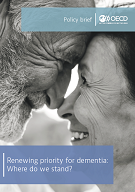Health
Dementia and Care
|
Dementia is a debilitating condition for which there is currently no cure. An estimated 44 million people are living with dementia worldwide and health systems and social services often fail to provide adequate support. Many people living with dementia do not receive a timely diagnosis and face poor quality of life and loss of independence, while the families and carers who support them are under huge strain, suffer ill-health and are unable to work. There is a need for urgent action and the OECD is working to support countries in developing and implementing better policies that can improve the lives of people living with dementia. |
|
Focus - Renewing priority for dementia: Where do we stand? |
|
|
|
World Dementia Council Summit London, 5 December 2018 Across the OECD, 19 million men and women are living with dementia, with far too many experiencing a poor quality of life. Worldwide, someone develops dementia every three seconds. With no clinical breakthroughs, the number of people with dementia is set to grow and OECD countries are under increasing pressure to address the consequences of dementia. As global leaders return to London on 5 December 2018 to discuss dementia, five years after the World Dementia Council was established following the December 2013 G8 Summit on Dementia, this new OECD Policy Brief looks at what progress countries have made over the past five years.
|
EventsThe World Dementia Council was established following the December 2013 G8 Summit on Dementia. It aims to provide global leadership in improving the conditions for research and innovation in dementia treatments, and in improving dementia prevention and care. The OECD hosted the second meeting of the World Dementia Council in Paris on 23 July 2014, and continues to play and important role in the Council’s work.
|
|
Resources |
|
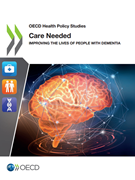 |
Care Needed: Improving the Lives of People with DementiaJune 2018 - Across the OECD, nearly 19 million people are living with dementia. Millions of family members and friends provide care and support to loved ones with dementia throughout their lives. Globally, dementia costs over USD 1 trillion per year and represents one of the leading causes of disability for older people. These numbers will continue to rise as populations age. Until a cure or disease-modifying treatment for dementia is developed, the progress of the disease cannot be stopped. This report presents the most up-to-date and comprehensive cross-country assessment of the state of dementia care in OECD countries. In recent years, OECD countries have enhanced their efforts to provide high-quality dementia care during diagnosis, early and advanced dementia, but improving measurement is necessary for enhancements in care quality and outcomes for people with dementia.
|
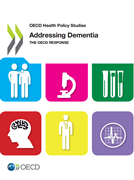 |
Addressing Dementia: the OECD ResponseMarch 2015 - The large and growing human and financial cost of dementia provides an imperative for policy action. It is already the second largest cause of disability for the over-70s and it costs $645bn per year globally, and ageing populations mean that these costs will grow. There is no cure or effective treatment for dementia, and too often people do not get appropriate health and care services, leading to a poor quality of life. Our failure to tackle these issues provides a compelling illustration of some of today’s most pressing policy challenges. We need to rethink our research an innovation model, since progress on dementia has stalled and investment is just a fraction of what it is for other diseases of similar importance and profile.
|
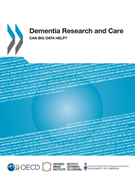 |
Dementia Research and Care - Can Big Data Help?February 2015 - What potential does “Big Data” hold for finding new approaches to discovering a cure and disease-modifying therapies and to improve social care services for the growing number of people with dementia? Government leadership and public-private partnerships will be needed to create and sustain big data resources. Key next steps are to create national infrastructures supporting “broad and deep” data; to develop international benchmarks to compare the performance of health systems; and to develop an international pilot project to demonstrate the benefits of linking broad and deep data to dementia research and care. |
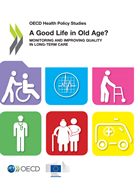 |
A Good Life in Old Age? Monitoring and Improving Quality in Long-term CareJune 2013 - As ageing societies are pushing a growing number of frail old people into needing care, delivering quality long-term care services – care that is safe, effective, and responsive to needs – has become a priority for governments. Yet much still remains to be done to enhance evidence-based measurement and improvement of quality of long-term care services across EU and OECD countries. This book offers evidence and examples of useful experiences to help policy makers, providers and experts measure and improve the quality of long-term care services. |
|
FURTHER READING
|
|
To access the complete library of OECD resources on dementia, including publications and freely available working and policy papers, click here |
|
Key data
Across 19 OECD countries in 2019, more than 5% of adults aged 65 and over received a prescription for antipsychotic medicines. This masks the wide variation in prescribing rates between countries. Moreover, age-standardised rates of antipsychotic prescribing were higher for women than for men in every OECD country. On average across 19 OECD countries, women were 31% more likely to be prescribed antipsychotic medication than men.
Antipsychotic prescribing rates by sex, 2019 (or nearest year)
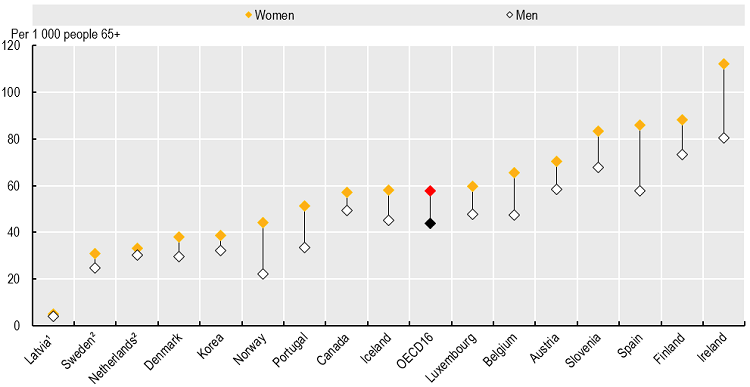
Source: Indicator on Dementia in Health at a Glance 2021: OECD Indicators.
Access the data behind the graph.
Contact us
For any queries about Dementia and Care, please write to Ms. Elina Suzuki: elina.suzuki@oecd.org.
 Follow us on Twitter via @OECD_Social
Follow us on Twitter via @OECD_Social
Related Documents

